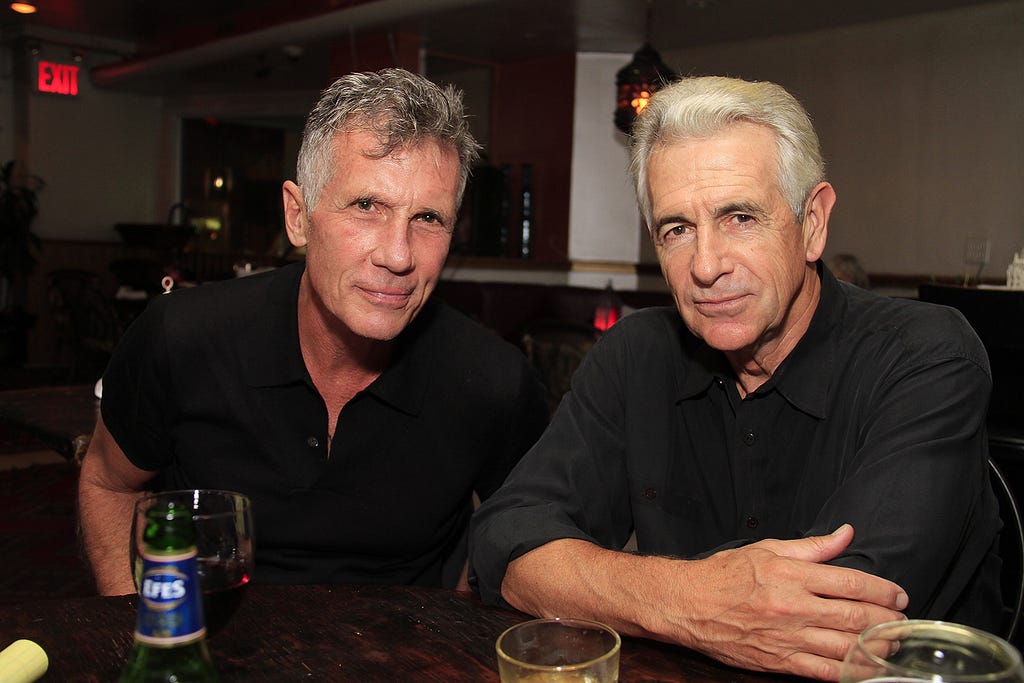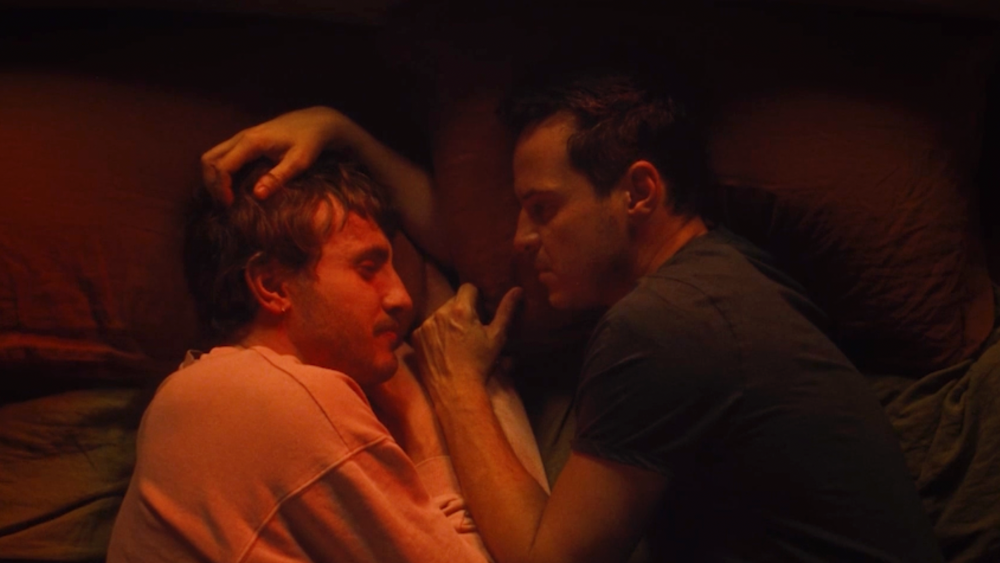interviews
INTERVIEW: Michael Cunningham and James Naughton

by Kyle McCarthy

Selected Shorts, the radio program, is sometimes called “bedtime stories for adults,” but when seen live at Symphony Space, it seems closer to ritual, or incantation. The actor, spotlighted, stands alone on stage and reads; the darkened audience laughs and gasps and, sometimes, falls into a sober, brooding silence.
One of the program’s most popular stories is “White Angel” by Michael Cunningham, first read over twenty-five years ago. Cunningham’s breakout story, “White Angel” was published in The New Yorker and became the germinating seed of his first novel, A Home at the End of the World. It has all the crystalline urgency of a character telling the only story he has to tell. James Naughton, the actor who read Cunningham’s story, gives this urgency a sonorous gravitas. His pauses click with the meter of Cunningham’s words.
In a Turkish restaurant on West 100th street, after Selected Shorts’ 30th birthday celebration, I talked with Michael and James about avatars, Stella Adler, and the power of a hushed room. The two men were gracious and greatly admiring of each other’s work; the vibe between them was friendly and intimate. Selected Shorts, I realized, had made them co-collaborators.
Kyle McCarthy: Jim, I want to start by asking if you remember reading “White Angel” for the first time.
James Naughton: Very well. It was the first time I had ever read anything in Selected Shorts. When they called and said, we want you to read a short story to a live audience, I thought, people pay to come sit and be read to? What kind of audience is this? And then of course I went and did it and it was this incredible experience, and I‘ve been doing it ever since. After that experience, I remember thinking, ‘Oh, I get it.’ It’s the purest form, the most ancient form, of entertainment. What’s wonderful is that the audience sits there and hears an incredible story, and they cast it, they do whatever the setting is in their mind, and it’s a really wonderful, creative experience for everybody.
KM: Are you doing that casting in your mind? When you read it?
JN: We all do.
KM: Do you see it?
JN: Yeah, that’s what we do. We put ourselves in a place. That’s the magic.
KM: Michael, do you remember, when you were writing this story, if you read it aloud to yourself as you were composing it?
Michael Cunningham: I read it to a couple of friends, which is one of the best bullshit detectors I know. It all looks kind of okay and kind of awful on the page, but then you read it to somebody, and you say, that line is alive, that line is dead. Cut the dead line. And you couldn’t see it, but the minute you hear it, pfft. (Soft whistle, like a sword swishing.)
KM: And so, when you heard James reading your story, did you hear the same pauses and intonations that you had imagined?
MC: No, it was more revelatory than that. It was new. Here was this auditorium full of people who have come to hear short stories being read. And Jim, Jim was like an avatar. Jim was bigger, and handsomer, and had a more beautiful voice, and I thought, Wow. Wow wow wow. It’s like hands that could hold your entire head in their palms. I thought, this is some fantasy version of me, improved. On the stage. At Symphony Space. Just kicking ass out of that story. It was amazing. It was huge, a turning point for me. But also, as I was telling Jim, I am no James Naughton, and never will be, but that night, I started to learn how to read a story to people. When I read, I’m still kind of doing James Naughton, from that night, twenty-five years ago. I learned about pauses, about directness, about gravitas. I just picked up so much. There was the thrill, and there was the education of it.
KM: Exactly. I felt like I was getting the same kind of education yesterday, reading the story, and then listening to it. I was moved when I read it, and then when I listened to it, I was just on the floor. I found myself wondering, Jim, as you read it to yourself to prepare, how much did you know where the pauses were?
JN: No, I didn’t know anything. There were pauses all through, which came from what the material was, the way it moved forward. Stella Adler used to say that acting is reacting. And so what you’re reacting to, in this case, is the material. You’re the storyteller.
MC: I think something that a stage actor knows, and a writer can forget, is that this is a story that you’re telling to people. The writing thing gets very abstract. It’s a message in a bottle that you throw into the ocean and maybe somebody will pick it up some day. So it’s easy, when you’re alone in your room with your computer, to lose track of the fact that you’re writing a book for people who will rewrite the book in their own minds. It’s an exchange. You’re not just putting it out, you’re putting it out in order to get a reaction. You’re interacting with your readers.
JN: It’s so intimate.
MC: Yeah, Selected Shorts is a simulation of what happens more often, when a reader is alone with your book. But you can’t say, I’d like to watch you read my story. But at Selected Shorts, you can.
JN: It’s the communal factor.
MC: Yeah.
KM: Well, that’s what struck me. So many people listen to podcasts, and take in information through their ears, all alone. And even a writer, composing by herself or himself, is listening alone. It seems like a totally different beast to have someone reading aloud in a room full of people. You get immediate audience feedback. One of the places where I really felt that audience feedback was humor, and so I wanted to ask you guys if you knew how funny the story was before it was read aloud.
MC: I meant for it to be funny. Most stories are either fundamentally tragic or fundamentally comic, but every story, if it’s tragic, should have jokes, and if it’s comic, should be threaded with tragedy. Otherwise it feels like a partial worldview. So I put in as many jokes as I possibly could.
JN: Because if it’s just tragic, it’s just like, death by literature.
MC: This is the night’s pretentious moment. Well, maybe not the night’s only pretentious moment, but certainly the biggest one so far.
KM: Go for it.
MC: I wasn’t exactly conscious, when I went back and rewrote “White Angel,” that the first half is full of forebodings and foreshadowings, and death imagery, and then there’s not a moment of it in the second half.
KM: You fool us!
MC: There’s nothing about a casket, all the morbid imagery stops, and you go to the party.
JN: So there’s gravitas in the beginning, but then you take us for a roller coaster ride.
MC: There’s an element of, I don’t want to call it trickery, but you work it.
KM: Yeah, there’s those eight words, “Here is Carlton several months before his death.” You give us that signpost, and we think, “Oh.” All the foreboding resonates, and then we get swept away on this positivity: it’s a party to beat all parties, we’re going places, we’re leaving Ohio, the young and the old are meeting. There’s a surge of “Yeah, we’re going to make it.”
MC: Yeah, that’s one of the most basic tricks. Actually tell the reader what’s going to happen, and then you try to distract the reader, so that the reader forgets what’s going to happen, so that when it does happen, it feels not only like a surprise, but it doesn’t feel gratuitous. It doesn’t feel like it comes out of nowhere. It feels like, how could I forget about that? Oh right, he’s going to die. I lost track of that.
KM: Right! And so, Jim, in your reading, do you feel like you are holding all these elements in your mind?
JN: No.
KM: You’re just on the track of where the story is?
JN: Yes. What I mean is, when I was reading your story, I’d read it several times before, but I didn’t have a plan. There was no artifice. I was just trying to tell the story. And inhabit it. That’s basically my job. We take on the thing, and we try to play the characters. We react to each other, if we’re players, working together, and we react to the material, if you’re out there by yourself.
MC: It’s different from writing, but I don’t know how different because, with the first draft, you’re just like, I don’t know, I don’t know, but then later you think, oh yeah, move it here, move it there. The calculated parts come in draft number three. You don’t really know what you’re doing,
JN: But then you realize, that’s what I did.
MC: Right. It’s weird.
KM: It’s almost as if, when Selected Shorts is really working well, the actors embody, or recreate, that moment of writing, where you don’t really know what’s happening, and you’re just sort of there, in that moment –
MC: I wouldn’t want to embarrass James, but James has a rare ability to do the performance, and yet honor the story. You join the story, you’re presenting the story, but you and the story are a team, you know? I mean, I don’t want to get all icky, but –
KM: I was certainly feeling that in the final lines of the story. Your voice is so full of emotion.
JN: I was moved, you know? That’s what it is. It isn’t artifice.
MC: You can’t really fake this shit, you know?
JN: We get moved by stuff that we’re doing, you know? I’m sure the writer does, too. Everyone in the audience, in the house, was. Everyone’s holding their breath.
KM: Yeah, it felt like that in the final paragraph, the final line about, I can’t even say her name. It’s so moving.
MC: Thank you. But the The New Yorker sent it back. (Laughter) And said, you know, the ending sucks. It was a different ending then. And I was like, yeah, the ending does kind of suck. It just sort of stops. So I decided to see what I could come up with. And I tried it this way and that way, and it took a few weeks, and I thought, maybe it just lands on the girl.
KM: Which seems perfect, because it’s surprising.
MC: You kind of work your way to it. You try it all sorts of ways, and then you pull that peripheral character out.
JN: I thought it was a brilliant ending. ’Cause it’s like, what do you say? And that’s what the best writing does. Whether it’s fiction, nonfiction, novels, short stories, it’s that kind of intimate contact with the reader. Then we do this thing, in a communal way, and it adds another element.
KM: Because you’re together at Selected Shorts, you can’t put the book down, you can’t look away. You’re just all together in it.
JN: I’m amazed that people keep coming to this. I mean, they fill it up!
MC: It’s so great, it’s so encouraging.
JN: It’s wonderful.
KM: Thank you guys so much for talking.









